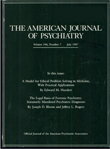Which depressed patients will respond to interpersonal psychotherapy? The role of abnormal EEG sleep profiles
Abstract
OBJECTIVE: The authors tested the hypothesis that patients whose episodes of major depression evidenced more neurobiological disturbance would be less responsive to psychotherapy. METHOD: The study subjects were outpatients who were given a diagnosis of recurrent major depressive disorder (unipolar or bipolar II), according to the Research Diagnostic Criteria, following an interview with the Schedule for Affective Disorders and Schizophrenia. They were classified into a group with normal sleep profiles (N = 50) and a group with abnormal sleep profiles (N = 41) on the basis of a validated index score derived from three EEG sleep variables monitored for 2 nights: sleep efficiency, REM latency, and REM density. The groups' responses to short-term interpersonal psychotherapy were compared by means of chi- square tests and life table and random effects model analyses. Responses to the addition of pharmacotherapy for subjects who did not respond to interpersonal psychotherapy were also compared. RESULTS: The patients with abnormal sleep profiles had significantly poorer clinical outcomes with respect to symptom ratings, attrition rates, and remission rates than the patients with more normal sleep profiles. Seventy-five percent of the patients who did not respond to interpersonal psychotherapy had remissions during subsequent pharmacotherapy. CONCLUSIONS: These findings help to define further a neurobiological "boundary" that may limit response to psychotherapy in depression. An abnormal sleep profile may reflect a more marked disturbance of CNS arousal that warrants pharmacotherapy.



